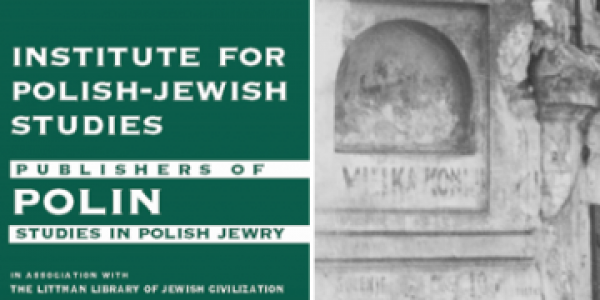Two courses on Eastern European Jewish history and civilization at University College London
05/10/2021 | Na stronie od 28/09/2021

Source: Institute for Polish-Jewish Studies
Details of two courses on Eastern European Jewish history and civilization at University College London.
1) History of the Jews in Poland
(HEBR0056)
François Guesnet, Dr.phil.
Professor of Modern Jewish History
Polish lands were the home of the largest population of Jews in the world for hundreds of years. Jews experienced an unprecedented extent of self-governance in a multi-ethnic setting, contributing to the emergence of a rich cultural and religious life.
If you would like to learn more about the history of Jews in Poland, you might like to know about this comprehensive course on Polish-Jewish history from the middle ages to contemporary times, taught by the Chairman of the Institute for Polish-Jewish Studies, Professor François Guesnet. It is a degree-programme course, but is available as a standalone course for those who do not wish to pursue a degree. “Mature students” who have attended this course in the past have found their contributions valued, and their experience a rewarding and enriching one.
For a full description of this course, please download the attached course description:<<<
Times and venues:
This course runs from 5 October 2021 until last week of March 2022
Lectures: Tuesdays 11 am-1 pm.
Seminars: Thursdays, 3-4 pm.
2) History of Yiddish Language, Literature, and Culture
(HEBR0046)
Led by Sonia Gollance (Yiddish language and literature)
co-taught in collaboration with Sima Beeri (Yiddish language, literature,
and history), Lily Kahn (Yiddish linguistics), Kriszta Szendrői (Yiddish
linguistics), and Sonya Yampolskaya (Yiddish linguistics)
This course will provide students with an overview of the rich and dynamic history of the Yiddish language and its associated literature and culture from its beginnings until the 21st century. The course will begin with an exploration of the origins and early development of Yiddish in Central Europe, and will introduce students to Old and Early Modern Yiddish literature, which includes a diverse variety of fascinating texts such as Yiddish translations of medieval European epics, Bible to personal memoirs documenting pivotal moments in Jewish history. The course will also examine the emergence of the thriving modern Yiddish literary and cultural scene in the mid-19th century in Eastern European Jewish centres such as Warsaw and Vilna, which led to the development of a vibrant interwar Yiddish-language press, theatre, cabaret, and film industry, in addition to a huge variety of Yiddish literature both original and translated.
The course will investigate the cataclysmic effect of the Holocaust on the Yiddish-speaking world, as well as the mass emigration of Yiddish speakers away from Eastern Europe, the fate of Yiddish in Israel, and the establishment of new Yiddish centres in Western Europe, North and South America, Australia, South Africa, and elsewhere in the early- to mid-20th century. The course will conclude with an examination of Yiddish language, literature, and culture in the present day. This will encompass the secular and non-denominational Yiddish world, including Yiddish in the academic world, Yiddish revitalization projects, contemporary Yiddish theatrical and literary endeavors; it will also include an examination of Yiddish in the Haredi (Ultra- Orthodox) world, which has developed its own linguistic norms, literature, and cultural institutions, and whose members comprise the bulk of present-day Yiddish speakers worldwide.
Times and venues:
This course runs from 5 October until last week of March 2022
Lectures: Tuesdays, 1-3 pm.
Seminars: Thursdays, 10-11 am.
For further information, see the Hebrew and Jewish Studies Department website:<<<
or<<<
Registration and details about fees for continued education students, contact the Department of Hebrew and Jewish Studies:
Email:<<<
or
Tel: 020 7679 7171, Internal: 37171